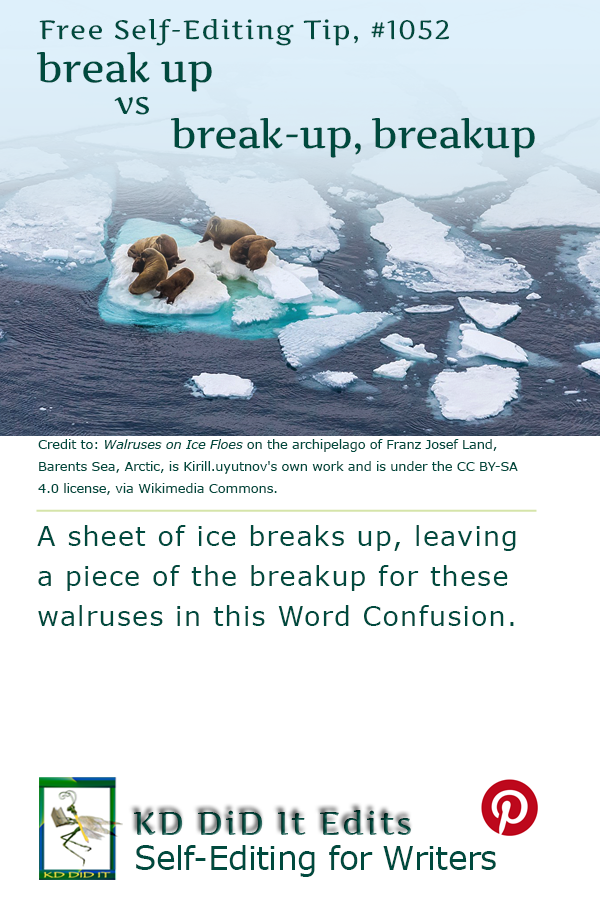Revised as of
28 Oct 2022
This word confusion, Break Up vs Break-up, Breakup, can be broken up into two parts. The first, the verbal phrase break up is, um, a verb. The other half, which can be spelled break-up or breakup, is strictly a noun.
Break up is versatile from the friendly to the vicious end of a relationship, rolling into uproarious laughter, an interfering radio, starting a vacation, or causing something to be sundered.
It’s up to you whether you use break-up or breakup, just be consistent in your choice. There isn’t much a breakup can do. It’ll either cause something to be sundered or end a relationship.
In any case, you may want to explore “Heart Broken / Broken Heart versus Heartbroken“, “Brake versus Break“, or “Break Through versus Breakthrough“.
Word Confusions . . .
. . . started as my way of dealing with a professional frustration with properly spelled words that were out of context in manuscripts I was editing as well as books I was reviewing. It evolved into a sharing of information with y’all. I’m hoping you’ll share with us words that have been a bête noire for you from either end.
If you found this post on “Break Up vs Break-up, Breakup” interesting, consider tweeting it to your friends. Subscribe to KD Did It, if you’d like to track this post for future updates.
| Break Up | Break-up, Breakup |
|---|---|

They Break Up by Mohamed Hassan is in the public domain, via PxHere. |

IMO Helping to Mitigate the Impacts of MV Wakashio Oil Spill in Mauritius is under the CC BY 2.0 license, courtesy of the International Maritime Organization. — That’s a bad breakup. |
| Part of Grammar: | |
| Verb, phrasal
Third person present verb: breaks up |
Noun
Plural: break-ups, breakups |
Disintegrate or disperse
[Of a gathering] Come to an end and disperse
[With reference to a couple] End a romantic or sexual relationship [Mainly North American] Start laughing uncontrollably
[With reference to a phone or radio signal] Be interrupted by interference [Mainly British] End the school term |
The separation, disintegration, or breaking up of something into several pieces or sections
|
| Examples: | |
| The gray clouds had begun to break up.
The bones had broken up into minute fragments. Break up the chocolate and place it in a bowl. He intends to break the company up into strategic business units. After about an hour, the meeting broke up. Officers broke up the illegal rave. Richard was sorry to break up the party. I was heartbroken when we broke up. I recently broke up with my fiancé. The whole cast broke up. Seeing the children again nearly broke her up. You’re breaking up, I can’t hear you. We broke up for the summer. |
It led to the breakup of the Ottoman Empire.
The break-up of London bus workers into separate companies has led to huge differences in the earnings of drivers across the capital. In that year, however, the breakup of the USSR implied the break-up of the forces. Large quantities of oil are released after the breakup of a tanker. There had been a number of marriage break-ups this past year. For a start, marriage breakups are on the increase, which often results in people taking on a mortgage later in life. The organization is running adverts in the farming press this week urging people to contact them to talk about their concerns regarding relationship break-ups. Marriage breakups are on the increase so grandparents have been crucial in those instances to provide support and care while the adult child gets him- or herself back on their feet. |
| History of the Word: | |
| Old English brecan (verb) is of Germanic origin and related to the Dutch breken and the German brechen, from an Indo-European root shared by the Latin frangere meaning to break. | It was first recorded in 1785–95, as the noun use of the verb phrase break up. |
C’mon, get it out of your system, bitch, whine, moan . . . which words are your pet peeves? Also, please note that I try to be as accurate as I can, but mistakes happen or I miss something. Email me if you find errors, so I can fix them . . . and we’ll all benefit!
Satisfy your curiosity about other Word Confusions on its homepage or more generally explore the index of self-editing posts. You may also want to explore Book Layout & Formatting Ideas, Formatting Tips, Grammar Explanations, Linguistics, Publishing Tips, the Properly Punctuated, Writing Ideas and Resources, and Working Your Website.
Resources for Break Up vs Break-up, Breakup
Apple Dictionary.com
Dictionary.com: breakup
Lexico.com: breakup
Pinterest Photo Credits:
Walruses on Ice Floes on the archipelago of Franz Josef Land, Barents Sea, Arctic, is Kirill.uyutnov‘s own work and is under the CC BY-SA 4.0 license, via Wikimedia Commons.


